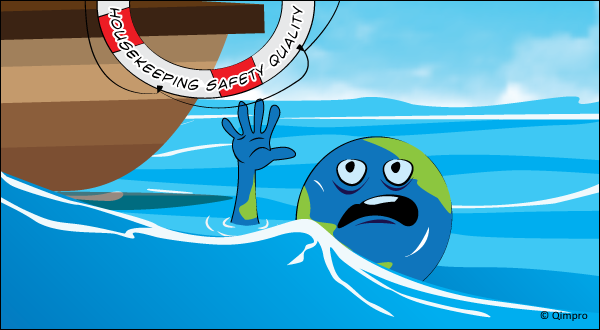New Normal – SOS Quality Strategy

Quality History
Once upon a time, Quality was assessed by vegetable and fruit customers, in the market place. They inspected the outputs of Mother Nature, by feel and smell, before purchase.
Centuries later, the skilled craftsman seeded a basic concept of Quality. He integrated 100 % self-inspection into his work, activity-by-activity. This icon for Quality built geometric pyramids in Egypt, as well as magnificent temples in India.
Then came industrialization. With that was born the inspector. Quality evolved to quality-control. The inspector facilitated maintaining the standard. Quantity was the focus of industrialization. Quality (the perfection of the craftsman) suffered.
Post World War II, Japan, a shattered economy, had to survive in a globally competitive market. As a strategy, the Emperor mandated adoption of quality-improvement, to challenge the standard. The goal was to carve a market share in the overseas market. The by-product of quality-improvement was a significant reduction in the Cost Of Poor Quality (COPQ). Japan learned to copy a design, perfectly, and produce it cheaper.
Performance Excellence History
Decades later, Japan launched economic warfare on the US. As a defence strategy, the US developed and adopted the Malcolm Baldrige model for Performance Excellence. Quality was now a top-down strategy. The US economy was reborn, in manufacturing and services.
Realizing the resistance offered by US companies, Japan looked for greener pastures. Japan entered Europe. Europe had recently unified and was going through a period of adjustment.
Owing to the unanticipated Japanese economic aggression in Europe, local manufacturers were caught on the back foot, with a significant loss in market share. As a counter strategy, a united Europe developed and adopted the ISO 9001 Quality Standard. The intent was to build a robust infrastructure, company by company, for quality-control and quality-improvement.
Simultaneously, the US, through its operations in Europe, battered the local manufacturers. Consequently, Europe now needed a strategy to contain US and Japanese economic aggression, in its own backyard. This led to the birth of the European Foundation for Quality Management (EFQM) Performance Excellence model. Europe was, in turn, reborn with a top-down strategy for Quality.
Post liberalization, India felt the Quality pressure for economic survival. This resulted in the creation of the CII Exim Bank Business Excellence Award (based on the EFQM model) and the IMC Ramkrishna Bajaj National Quality Award (based on the Baldrige model). Independently, both succeeded in improving the competitiveness of Indian organizations, located in India and overseas. By the turn of the century, India had returned from the brink.
New Normal World
The big challenge we now face is that of the pandemic Coronavirus, and its negative impact on the global economy. With universal lockdowns, the demand for products and services has shrunk. In addition, industry is burdened with excess capacity. The universal question is “How do we restart our business?”
In India, the economic and social scene has been further aggravated by the four lockdowns, and loss of jobs; as well as oceans of migrant workers, with kith and kin, returning to their respective homes, without any formal transport in the summer heat. This tragedy was totally unanticipated.
Further, post-lockdown, we are talking of a New Normal World, characterised by Social Distancing and Work From Home.
In this context, Performance Excellence, while it has the right framework, is inadequate for the stormy present. It should be noted that historically, Performance Excellence has been characterised by IMPORTANT but NOT-URGENT features.
For the stormy present, namely the New Normal World, results must be immediate. Survival is at stake. Within the Performance Excellence framework, we need to dare with ideas for development that address IMPORTANT and URGENT. This may take several weeks.
SOS
Till we develop the New Normal model, I wish to propose a SOS Strategy for restarting a business:
- First, address Housekeeping and Maintenance, on a war footing
- Next, address Safety, with special focus on the work force and society
- Thereafter, focus on Process-Quality Improvement, to drastically reduce COPQ.
Random Thoughts
- Why is Disaster Management not considered a priority by Leadership?
- How can we handle the real and tragic problems of migrant workers?
- When will we be enlightened and come out from our ivory towers?
- We need to treat every creation on Earth with dignity. Or else?
- The greener pastures, post-lockdown in India, will be: Farming; Education; Healthcare; Retail. They will create jobs along their respective supply chains. Good for India.
